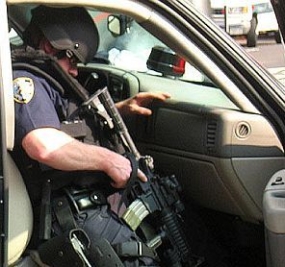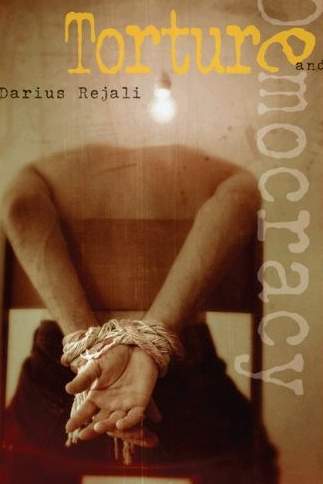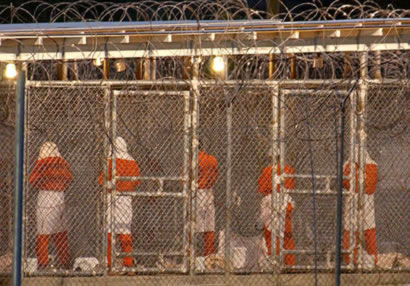Podcast: Play in new window | Download
Updates:
- Disneyland To Be Built In Iraq
- Supreme Court Ruling: ID Card For Indiana Voters
- U.S. Vice President Dick Cheney: Leaving No Tracks
Operation Torch:Â Heavily Armed Subway Patrols Making New York City Safer?
A couple weeks ago our own co-host Heidi Boghosian described how under cover policemen and a K9 unit were intimidating a subway rider on the platform with the dog barking viciously near his face. We’ll follow up on that story and also talk about the teams of police armed with MP5 submachine guns, body armor and bomb sniffing dogs now patrolling the subway systems of New York City. They’re called Torch Teams. Torch, an acronym for Transit Operational Response With Canine and Heavy Weapons. The teams are funded to patrol in 12 hour shifts everyday, Penn Station, Herald Square, Columbus Circle, Rockefeller Center Times Square and Atlantic Avenue in Brooklyn.
Co-host Michael Smith also commented on the use of police car convoys (photo above) that rally at ground zero and run up the FDR with lights blazing. Moore says it’s a federally funded event that acts as “window dressing” but he says, when you see police state displays such as Operation Torch and the police car convoys, know that it is only the tip of the iceberg. We’ll be investigating more on the depth of the police state in weeks to come.
Guest: Jonathan Moore, attorney with the National Police Accountability Project
—
Here on Law and Disorder we’ve taken an in depth look at torture with various authors and guests including authors Al McCoy, Marnia Lazreg and Henri Alleg. Today we speak with Reed College professor Darius Rejali, author of the book Torture and Democracy. In this book, Rejali tracks behaviors, trends and traditions that have brought torture to where we see it has emerged today. Rejali, a leading expert on government interrogation techniques, argues that torture is an ancient craft and technique passed on from teacher to apprentice.
Rejali says knowledge of the torture craft often flows both ways between colonial powers and occupied peoples. This is a powerful book filled with information on techniques. One review writes, this book lays the groundwork, torturers and their keepers may find it useful, not as an academic study but as a field manual.
Guest – Professor Darius Rejali


